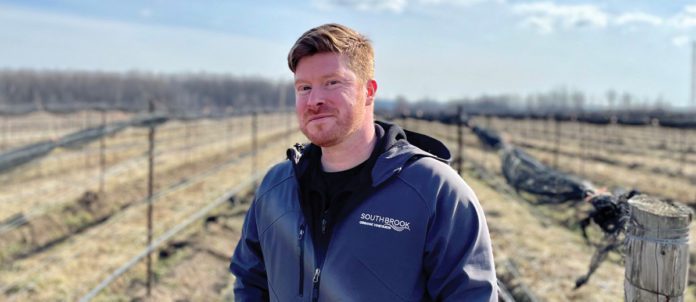Canada’s first certified organic and biodynamic winery, Southbrook Vineyards has long been a pioneer in sustainable winemaking. Now, with a new winemaker at the helm and a fresh, relationship-driven approach to business, Southbrook is continuing to champion greener viniculture practices at a time when the climate crisis is making sustainability top of mind for consumers and producers alike.
Southbrook proprietor Bill Redelmeier says the pandemic has spurred a positive change in the way the winery connects with its customers. “It forced us to do really what we knew we should be doing from day one but didn’t have the courage to do,” he explains.
Rather than focusing on selling wine through the LCBO, which had been Southbrook’s priority in the past, Redelmeier says the winery is now building its business by selling directly to individuals and restaurants.
The rise in online shopping during the pandemic made this a natural change in Southbrook’s business model. “All of a sudden, people realized they can buy wine online,” says Redelmeier, who estimates he has driven more than 170,000 km, personally delivering wine to customers. “What’s great about it is it allows me to chat, to visit, to get to know my customers…it’s not a faceless delivery.”
Redelmeier believes that the ability to cultivate these personal relationships plays a major role in customer retention. “It’s a much more stable business,” he says. “It’s way better to maintain a customer that you’ve already got than it is to try and find new customers.”
The last year has marked another major transition for Southbrook, with its longtime winemaker Ann Sperling stepping back to focus on other projects. Casey Hogan, who had worked closely with Sperling for the past three years, is now leading the charge.
Hogan says he has been drawn to biodynamic wines since early in his career when he worked as a sommelier. “One of the reasons I was interested in pursuing a job at Southbrook was some of the wines that I tasted working as a sommelier years ago – I was able to see that the biodynamic ones produced a more interesting and soulful product,” he says.
Hogan takes much of his winemaking inspiration from Sperling, saying he wants to build upon the work she has done at Southbrook over the past decade and a half. The winery recently released new vintages of its Triomphe VQA range, which include cabernet franc rosé, sparkling rosé, riesling, chardonnay, cabernet franc, gamay, merlot, and pinot noir.
The new wines feature labels that highlight Southbrook’s ongoing dedication to sustainability. Beyond its organic and biodynamic designations, Southbrook has also been recognized with certifications by Demeter, ECOCERT Canada and LEED (Leadership in Energy and Environmental Design) for its eco-friendly approach. The Triomphe wine labels shine the spotlight on the winery’s initiatives, such as cultivating milkweed on the property to support monarch-butterfly populations.
Redelmeier hints that Southbrook will be launching another major sustainability initiative later this year. In the meantime, he’s excited to see more consumers and operators taking an interest in organic wine. “Today, we no longer have to explain to people that there is such a thing as organic wine,” he says.
“A lot of restaurants talk about ‘we use nothing but local and organic ingredients,’ but their wine list is straight off of the LCBO,’” Redelmeier says, adding that this is gradually changing, as more restaurants with sustainable-food programs curate drink menus that reflect the same ethos.
Southbrook wants to continue to blaze a trail for the province’s up-and-coming organic vineyards. “There are growers and wineries asking us questions about, not only organics and biodynamics, but also sustainability in general,” Redelmeier says. “The way wine regions advance is looking at what other people are doing and being able to do it better.”
By Jessica Huras


















